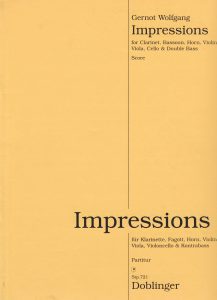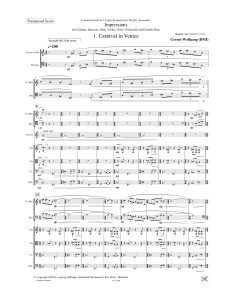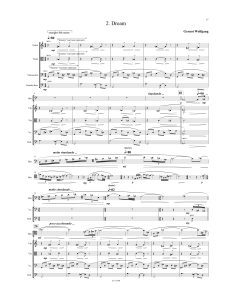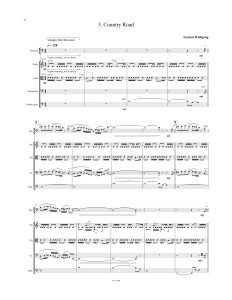IMPRESSIONS (2002)
for clarinet, bassoon, horn, violin, viola, violoncello & contrabass
Doblinger Music Publishers,
study score (catalog # Stp.721),
parts (catalog # 06 930)
05/11/2002 at a Pacific Serenades concert in Los Angeles, CA by Helen Goode - cl, Judith Farmer - bsn, Brian O'Connor - hn, Roger Wilkie - vln, David Walther - vla, David Speltz - vc and Bruce Morgenthaler - cb
Ursula Krummel for Pacific Serenades
Gernot Wolfgang, VIENNA AND THE WEST (2019), Albany Records CD TROY 1760
_____________________________________________________
DOWNLOAD PROGRAM NOTES (English)
DOWNLOAD PROGRAM NOTES (German)

Stream on Spotify (album link, tracks 5-7)
Stream on YouTube:
1. Carnival in Venice
2. Dream
3. Country Road
More information about the recording of Impressions on the album VIENNA AND THE WEST
_____________________________________________________
Purchase the sheet music for Impressions at:
Theodore Front Musical Literature, Inc. (Score)
Theodore Front Musical Literature, Inc. (Parts)
Trevco Music (Score & Parts)
sheetmusicplus.com (Score)
sheetmusicplus.com (Parts)
Reviews:
“Next comes a true masterpiece – “Impressions”, for clarinet, bassoon, horn, and string quartet (just one violin, but adding a bass viol). Now this one Grooves! In the first movement, “Carnival in Venice”, we hear infectious, jazzy rhythms, with moments here and there reminiscent of Poulenc’s fabulous Sextet. The 3rd movement, “Country Road”, is similar, but with the jaunt of a good ol’ American cowboy! It’s far too short (just 2 minutes); I wanted more. These outer movements flank a passionate, lyrical central movement, “Dream”. ”
David Rowe, Classical CD Reviews
“Gernot’s musical style is greatly expanded tonality, but with wonderful touches of jazz and sometimes folk-like characteristics that are invariably very exciting … a superior work by a very gifted modern composer.”
Ronald Klimko, The Double Reed
“Impressions for clarinet, bassoon, piano, French horn and a string quartet consisting of violin, viola, cello and bass swings from the outset. Wolfgang clearly had fun cooking this piece up on commission from Ursula Krummel for the Los Angeles-based chamber music series Pacific Serenades, and pulls out all the stops in its short multiple movements. The second section, by contrast with the first, begins in a purely classical vein, played by the string quartet without the other instruments, but when the full octet comes back in the music suddenly bursts into a funky jazz beat à la the early-1960s Blue Note style, except with classical development thrown in, as well as various pauses and more classical interludes (including a brief clarinet-bassoon duet). The bass then plays pizzicato like its jazz cousin and the music assumes a halfway stance between jazz and classical. The second movement could be described as a classical slow blues, and is equally creative, including a slow section in which the violin and viola duet a cappella. In the brief final movement, “Country Road,” the music sounds almost like something the Turtle Island String Quartet would have come up with. For me, this was the highlight of the album, the most imaginative and swinging piece in this set.”
Lynn René Bayley, The Art Music Lounge
“The three-movement chamber piece, Impressions (2002), features some great ensemble writing that also adds some good dramatic shape. The addition of double bass with the wind lines punctuates the somewhat jazzy nature of the rhythms which sometimes have a Stravinskian sensibility. The central movement gets to explore more of Wolfgang’s lyrical style and lets the strings shine a bit more in some deeply-moving music. The final movement connects with an over-arching theme of the album as it heads off onto a “Country Road” with a delightful, almost Americana feel.”
Steven Kennedy, Cinemusical
“The opening movement of “Impressions” sounds like a jazz-drenched film soundtrack, even when the strings intrude with an agitated melancholic outburst; soon back comes rhythmic drive. Another Wolfgang trademark is that he is fond of musical dreaming; the second movement is called precisely that – Dream. It’s a slow ghostly waltz with plenty of intense solos, from the horn in particular. Imagine a musical analogue to Hopper’s “Nighthawks” and that’s something of the effect here. To end there’s a country fiddle style finale – short, snappy and decidedly joyful.”
Jonathan Woolf, Musicweb-International
“Standouts include .. the epic “Impressions” for clarinet, bassoon, horn, violin, viola, cello, and double bass. Upon first hearing the three movements of the latter piece called “Carnival in Venice”, “Dream” and “Country Road”, the composer somehow managed to take me from a heady night at a carnival (it could have been in either Italy or Venice Beach, LA), to a smoky Viennese salon, to racing down the Ventura Freeway with the wind blowing through my hair. Don’t believe me? Have a listen.”
Jeffrey Palmer, CutCommon
“Rhythm is a factor here more than anywhere else on the release, with the opening “Carnival in Venice” exuding a seductive swing feel, despite its 7/4 time. Pizzicato and bowing by the strings add to the propulsion, though in truth all of the instruments give the material drive. Rhythm asserts itself in the central “Dream” movement, too, albeit this time as a languid, moody waltz, and in the rousing swing of “Country Road,” in particular its fiddling-styled background of repeating sixteenth notes.”
Ron Schepper, Textura


